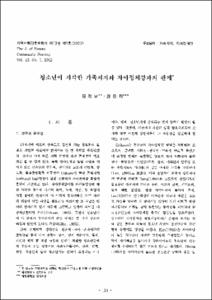청소년이 지각한 가족지지와 자아정체감과의 관계
- Keimyung Author(s)
- Kim, Chong Nam
- Department
- Dept. of Nursing (간호학)
- Journal Title
- 지역사회간호학회지
- Issued Date
- 2002
- Volume
- 13
- Issue
- 1
- Keyword
- Family support; Ego identity
- Abstract
- In the present study we have attemptde to explore the relationship between family support that young people receive and the level of Ego Identity that they develop. We started the present study with the purpose of providing parish nurses withe some basic data for nursing intervention for family and school nursing, as well as for community health care.
We conducted the present study during the period of October 15, 2001 throrgh November 5,2001. The objects of this study were Inmunge High School students chosen from a school in Daejon. The subject students were selected randomly from each grade in that school. The number of subjects selected were 120 boys and 113 girl(tltal:233).
The research tool that we used to measure perceived family support received by students was one that Ga Eon Lee revised for high school students on the basis of Cobb's theory. To measure the subject students' Ego Identity level we used Bong You Sho's "Ego Identity scale".
that he revised from Dignan's "Ego Identity scale" for Korean high school students. Data were statistics of frequencies, percentage, t-test, ANOVA, and Pearson correlation coefficient.
The findings of the present study indicate that:
1) The mean of family support thath the subject students feel that they received was39.99 on the family support scale, and the mean of the students on the Ego Identity scale was 186.16. 2) The support that the subjects received from their own family had a statistically significant correlation with their Ego Identity (r=.93,p=.00).
3) Various factors had a significant correlation with the level of family support perceived by the subjects: the subject's grade (F=6.39, P=.04), the subject's religion (t=6.39, p=.00), the family's economic situation (F=6.39, P=.04), the birth order (F=27.61, P=.00), the father's education (F=23.17, P=.00). parental relationship (F=2657.03, P=.00), and the structure of the family (F=-9.65, P=.00).
4) Various factors had a significant correlation with the level of the subject's Ego Identity: the subjects religion (t=6.20, p=.00), the family's economic situation (F=12.56, P=.00),the birth order (F=22.85, P=.00), the father's education (F=20.69, P=.00), parental relationship (F=938.73,P=.00), and the structure of the family (F=-8.74, P=.00).
5) Analyzing sources of support within the family, family members whom the subjects trust most (F=3.08, P=.03) and family members to whom they talk most (F=5.85, P=.00) showed the most significant differences. Analyzing sources of support within the family that affect the level of the subjects' Ego Identity, family members whom the subjects trust most (F=3.30, P=.02) and family members to whom they talk most also showed the most significant differences.
- Alternative Title
- The Relationship between Family Support and Ego Identity of Young People
- Keimyung Author(s)(Kor)
- 김정남
- Publisher
- College of Nursing
- Citation
- 김정남 and 권윤희. (2002). 청소년이 지각한 가족지지와 자아정체감과의 관계. 지역사회간호학회지, 13(1), 124–136.
- Type
- Article
- ISSN
- 1225-9594
- Appears in Collections:
- 2. College of Nursing (간호대학) > Dept. of Nursing (간호학)
- 파일 목록
-
-
Download
 oak-bbb-05036.pdf
기타 데이터 / 727.77 kB / Adobe PDF
oak-bbb-05036.pdf
기타 데이터 / 727.77 kB / Adobe PDF
-
Items in Repository are protected by copyright, with all rights reserved, unless otherwise indicated.